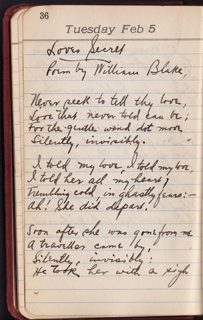
Practically unimportant
Spent day & eve here and
there among friends
Slept late.
(My birthday according
the English date.)
—————–
I guess Papa wasn’t that excited about this birthday, since he characterized the day as “practically unimportant.” I think he meant it in the literal sense, too, as in “I derived no practical benefit from this day, and besides, I only pay attention to my Hebrew calendar birthday, not this one.”
I certainly know what it’s like to be less-than-thrilled about a birthday when I don’t think things are going my way, and in thinking about Papa’s last few weeks I can understand why the he’s in no mood to take stock of his life or gear up for a milestone. Let’s take a quick inventory:
- On Papa’s Hebrew calendar birthday, he spent the day thinking about “blasted hopes” and “bitter disappointments” and at night cried with homesickness
- He worked hard for weeks on a meeting to revive a lagging chapter of the Zionist Organization of America, but the meeting wasn’t what he’d hoped
- He had a truly upsetting romantic episode that intensified his loneliness and had him quoting poetry for days
- He was installed as an officer at B’Nai Zion, a positive development but perhaps enough celebrating to suit him for a while
- For much of the previous few weeks, the entire country watched and waited while Woodrow Wilson, one of the most historic figures of Papa’s time and someone he admired greatly, took ill, clung to life, and finally died
- He capped it all off with a move to a new apartment, which, I think, intensified his feelings of loneliness
With all this going on in the heart of cold New York winter, it’s no wonder he feels unwilling, perhaps even too tired, to face his birthday head-on.
At least that’s how this all feels to me, which brings up a personal point: I am far from objective when I interpret these entries, and in fact I don’t want to be since I’m pursuing this project for personal reasons, to understand and pursue the warmth and quiet I felt around Papa, a sense of ease I haven’t known for thirty-five years. When Papa doesn’t write much for the day, when I have fewer facts to research and details to write my own posts around, the only way I can continue the pursuit is to fill in the blanks with my own experience.
As I’ve noted before, I am comforted by Papa’s youthful ordeals because I know he weathered it all and ended his life happy, capable of inspiring others. But I wonder if this makes me too willing to find trouble in his light entries when my own worries are more pronounced. For example, I hate this time of year and can barely remember how to smile on some days; is that why I think Papa felt the same? Similarly, I feel convinced that the moments in Papa’s life I listed above really did make him ambivalent toward his birthday, but maybe I just have milestones on my mind because I just started a new job, a job I deliberately took to shake myself up. The type of work is unlike anything I’ve done, the culture is new, the business itself is highly specific with its own unfamiliar rules and language and style. It’s interesting; it’s a big change; it’s stressful. It’s hard to imagine that this change from my old familiar work life to something so new isn’t why I’m so focused on the effects of Papa’s milestones, his disorientation, his homesickness, his change to a new apartment, his installation as an officer in a new organization.
And that’s not all…
So who am I really talking about? What part of me is part of him? How will I know?






